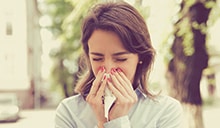On the one hand, after being cooped up all winter long, many of us have a serious case of Spring fever—can you hear that warm sunshine calling your name? On the other hand, you have the foggy, achy and itchy symptoms of allergies—yuck! So, what do you do? Try taking your go-to antihistamine.
Well, it’s worth a try. According to Erica Melling, PA, a provider at ChoiceOne Urgent Care, a partner of Gwinnett Medical Center, you can also give these 5 simple—and surprisingly effective—tips a try so your Spring doesn’t blow (literally):
1. Add spring cleaning to your schedule.
Although we often associate our seasonal sneeze with pollen and other outdoor allergens, spending too much time indoors may actually be the root of your problem. While there are some indoor allergens that persist all year, like pet dander and dust, they can be especially irritating when coupled with outdoor allergens. Even if your windows aren’t open, anytime you go outdoors, you’re bringing pollen back inside with you on your shoes, clothes, and pets.
So, if you weren’t in the mood to clean (is anyone ever?), hopefully, this will motivate you to add it to your weekly to-do list. After all, by regularly vacuuming carpets, dusting off surfaces, washing fabrics and changing out your air filters, you’ll be doing your allergy symptoms a huge favor.
2. Beware of mold.
As the temperatures outside continue to rise, so does the moisture in the air. Unfortunately, the two things that mold loves most are heat and moisture—so it’s essential to mold-proof your home. That means keeping your home 70 degrees or below and regulating moisture in the air with a dehumidifier (and fans in the bathroom). And don’t forget to clean those areas prone to accumulating moisture, such as showers and/or tubs, beneath sinks, around air conditioning units and under refrigerators.
3. Arm your body’s defense system.
Eating a balanced diet high in vitamins and nutrients is always a good idea, but it’s essential this time of year. After all, your body needs all the help it can get to fight off all those allergens—right? Actually, it’s important to eat a diet high in anti-inflammatory foods (antioxidants and probiotics) to do the exact opposite. Instead of ramping up your immune system, the idea is to help to temper your body’s immune response to allergens and reduce symptoms.
Make sure to add these foods to your grocery list (if you haven’t already):
• Coconut milk yogurt
• Apples
• Strawberries
• Turmeric (the supplement of Curcumin counts)
• Pumpkin seeds
• Salmon
4. Become a night showerer.
Pollen can stick to your body throughout the day – especially your hair. This is particularly true if you use hair products. If you go to bed without showering, all these allergens will transfer to your pillow and be inhaled throughout the night.
But you shouldn’t have to give up great looking hair throughout spring! If you opt for showering before bed, you’ll be able to get rid of any stubborn allergens that are stuck to your hair or skin. Also, be sure to wash your bed linens once a week to keep them free of dust mites, pollen and other allergens that build up over time.
5. Don’t overlook your over-all lifestyle.
In addition to minimizing exposure to allergens and eating a healthy diet, there may be other, everyday factors that you’re overlooking. For instance, excess weight can affect your respiratory system, putting pressure on the diaphragm, preventing you from expanding your lungs properly. In addition, too much stress can intensify allergy symptoms and make it harder for your body to bounce back.
Are your allergies holding you back?
While seasonal allergies may be unavoidable, your response to them can be the difference between enjoying the warm weather and finding yourself barricaded in your home—or anywhere away from pollen.
If your allergies are holding you back, let the experts at ChoiceOne Urgent Care provide you with the relief you need to get back to doing what you should be this spring—having fun with friends and family. These specialists are available seven days a week, from 8 a.m. to 8 p.m., at a convenient location near you. To learn more, visit gwinnettmedicalcenter.org/urgentcare.


